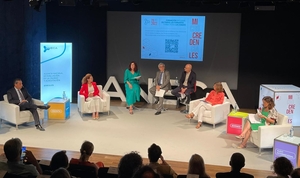ANECA holds the event "Micro-credentials. Inclusive training in all formats and for all ages”
-
20/07/2022
The 'Study on Quality Assurance in European University Alliances, European Degrees and Micro-credentials in the Spanish University System', and the ‘Framework Document for Quality Assurance of Micro-Credentials’ have been published.
The Director of ANECA was joined by Carmen Morenés Giles, Director General of the Telefónica Foundation; Emma Rodríguez Rodríguez, advisor to the Ministry of Labour and Social Economy; Jaume Blasco, advisor to the Ministry of Universities; and Miguel Ángel Acosta Rodríguez, Secretary General of the Conference of Social Councils

ANECA today organised the event “Micro-credentials: Inclusive training in all formats and for all ages” at the Teatro Real in Madrid. The event explored the possibilities of micro-credentials as training options which combine flexible methodologies and modules and can contribute to expanding the lifelong learning opportunities for everyone.
During the event ANECA presented two documents: Study on Quality Assurance in European University Alliances, European Degrees and Micro-credentials in the Spanish University System y el Framework Document for Quality Assurance of Micro-Credentialss.
There was also a debate around today's most pressing issues around micro-credentials in Europe: their potential, their quality assurance, who should offer them and in what format, and their contribution to a more inclusive, interconnected and innovative form of education and training, open to a more diverse student body.
Present for the debate were Mercedes Siles Molina, Director of ANECA; Carmen Morenés Giles, Director General of the Telefónica Foundation; Emma Rodríguez Rodríguez, Advisor to the Ministry of Labour and Social Economy; and Miguel Ángel Acosta Rodríguez, Secretary General of the Conference of Social Councils.
Other speakers included Mercedes Curto Polo, from ANECA's Internationalisation Commission and representative of the Agency in the ENQA working group on micro-credentials; José Ángel Domínguez, president of ANECA's Internationalisation Commission; and Jaume Blasco, advisor to the Ministry of Universities.
Mercedes Siles Molina, assured those present that ANECA has accepted the challenge of quality assurance of micro-credentials for lifelong learning, and that the study presented is "an initial proposal on which to start. There is a reality that we must respond to, and micro-credentials can do that”.
For her part, Carmen Morenés Giles considered it a "very important step forward that we, the Teléfonica Foundation, are here today". "For the Foundation it is essential to master digital skills in order not to be left behind", but other skills such as "critical thinking, problem solving, active learning, resilience, stress tolerance and flexibility are also necessary. Lifelong learning has become standard".
In this regard, Miguel Ángel Acosta Rodríguez underlined that "to establish micro-credentials in public universities, it is necessary to work very closely with companies, with employers", and that there has been "an absolute paradigm shift".
Along the same lines, Emma Rodríguez Rodríguez stated that this is "a change of paradigm that responds to the change in the workplace, necessitating a dynamic and porous response to the needs that have emerged in the pandemic and post-pandemic".
For Mercedes Curto Polo, "the European Universities initiative, the creation of European degrees and the promotion of micro-credentials are the expression of a new European higher education model, the development of which is currently in full swing".
José Ángel Domínguez stated that "ANECA considers that the proposal of micro-credentials by providers not traditionally related to teaching and in non-traditional areas may prove to be an innovative venture of great social, cultural and economic value".
Jaume Blasco stressed that "we can no longer rely on initial training capital, and that this can be stretched over the entire working life, which, by the way, is becoming longer and longer.
